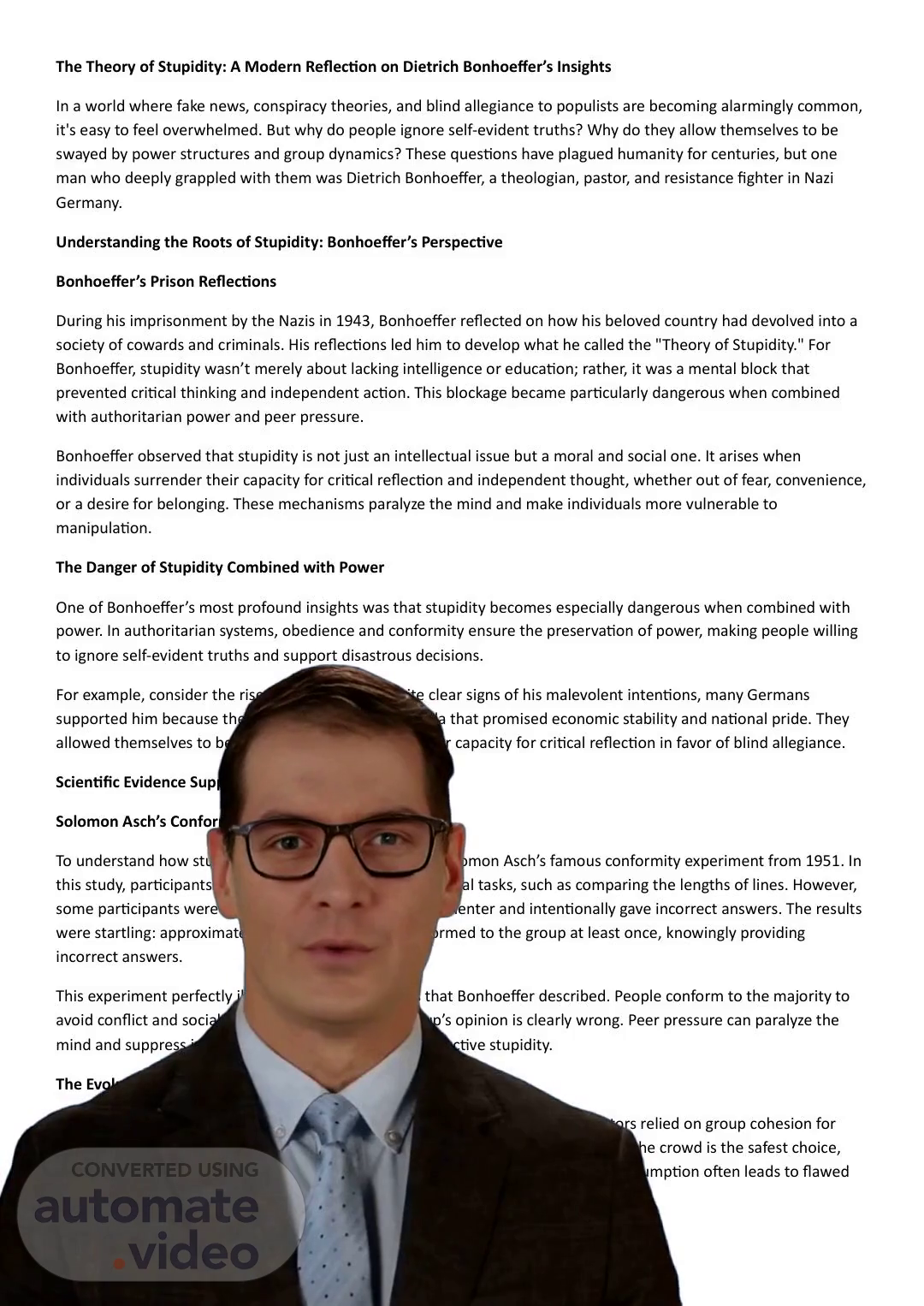
Microsoft Word - The Theory of Stupidity -A Modern Reflection
Scene 1 (0s)
[Virtual Presenter] In a world where fake news, conspiracy theories, and blind allegiance to populists are becoming alarmingly common, it's easy to feel overwhelmed. But why do people ignore self-evident truths? Why do they allow themselves to be swayed by power structures and group dynamics? These questions have plagued humanity for centuries, but one man who deeply grappled with them was Dietrich Bonhoeffer, a theologian, pastor, and resistance fighter in Nazi Germany. Bonhoeffer's prison reflections during his imprisonment by the Nazis in 1943 led him to develop what he called the "Theory of Stupidity." For Bonhoeffer, stupidity wasn't merely about lacking intelligence or education; rather, it was a mental block that prevented critical thinking and independent action. This blockage became particularly dangerous when combined with authoritarian power and peer pressure. Bonhoeffer observed that stupidity is not just an intellectual issue but a moral and social one. It arises when individuals surrender their capacity for critical reflection and independent thought, whether out of fear, convenience, or a desire for belonging. These mechanisms paralyze the mind and make individuals more vulnerable to manipulation. The danger of stupidity combined with power is evident in the rise of authoritarian regimes throughout history, including the Nazi regime in Germany. Bonhoeffer's theory suggests that when individuals abandon their critical thinking and independent judgment, they become susceptible to manipulation and exploitation by those in power. This is precisely what happened in Nazi Germany, where many citizens blindly followed the party line and supported the regime's atrocities despite clear evidence of its brutality. The theory also highlights the importance of fostering critical thinking and independent judgment in individuals, as well as promoting transparency and accountability in institutions. By doing so, we can mitigate the effects of stupidity and promote a more informed and responsible citizenry..
Scene 2 (2m 6s)
[Audio] The stock market bubble of the early 2000s serves as a prime example of the risks associated with herd behavior. Investors, influenced by each other, purchased overvalued stocks, convinced that the trend would persist indefinitely. However, when the bubble burst, many suffered substantial financial losses, highlighting the importance of critical thinking. To foster this mindset, it is essential to scrutinize information before accepting or sharing it, seeking credible sources and verifying claims rather than embracing them uncritically. During the COVID-19 pandemic, misinformation spread rapidly through social media, emphasizing the need for fact-checking. By consulting reliable health organizations, individuals could make informed decisions and safeguard their well-being and that of their communities. Another vital component in combating stupidity is taking responsibility. Recognizing that our actions or inactions have consequences is crucial. Rather than being swayed by peer pressure or the majority's opinion, we must make deliberate choices grounded in facts and values. Independent thinking is pivotal in breaking free from manipulation. It is essential to resist being influenced by authority figures and to defy prevailing trends or opinions. Only those who think independently can shatter the cycle of stupidity..